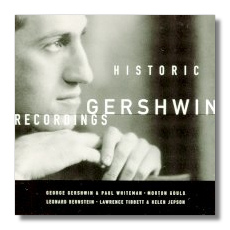
The Internet's Premier Classical Music Source
Related Links
- Gershwin Reviews
- Latest Reviews
- More Reviews
-
By Composer
-
Collections
DVD & Blu-ray
Books
Concert Reviews
Articles/Interviews
Software
Audio
Search Amazon
Recommended Links
Site News
 CD Review
CD Review
George Gershwin

Historic Recordings
Disc One:
- Rhapsody in Blue [George Gershwin, piano, Paul Whiteman and his Orchestra 1924]
- An American In Paris [George Gershwin, celesta solo, Victor Symphony Orchestra conducted by Nathaniel Shikret 1929]
- Porgy and Bess (Selections sung by Helen Jepson and Lawrence Tibbett)
- Lullaby (Summertime)
- Summertime and Crap Game
- A Woman is A Sometime Thing
- My Man's Gone Now
- I Got Plenty O' Nuttin'
- The Buzzard Song
- Bess You Is My Woman Now
- It Ain't Necessarily So
- Oh, Bess, Oh Where's My Bess?
- Orchestra and Chorus conducted by Alexander Smallens (Supervised by George Gershwin 1935)
- Strike Up The Band [Arthur Fiedler conducting the Boston Pops 1935]
- Rhapsody in Blue [George Gershwin piano, Nathaniel Shikret conducting Paul Whiteman's Orchestra 1927]
Disc Two:
- An American In Paris [Leonard Bernstein conducting the RCA Victor Orchestra 1949]
- Rhapsody in Blue [Morton Gould piano, Stokowski Symphony Orchestra 1955]
- Prélude #1, 2, 3, Solo from Porgy and Bess [Morton Gould piano 1955]
- Suite from Porgy and Bess (Arranged by Morton Gould with him conducting 1955]
RCA 09026-63276 AAD 64:58 & 73:07
- Rhapsody in Blue [George Gershwin, piano, Paul Whiteman and his Orchestra 1924]
- An American In Paris [George Gershwin, celesta solo, Victor Symphony Orchestra conducted by Nathaniel Shikret 1929]
- Porgy and Bess (Selections sung by Helen Jepson and Lawrence Tibbett)
- Lullaby (Summertime)
- Summertime and Crap Game
- A Woman is A Sometime Thing
- My Man's Gone Now
- I Got Plenty O' Nuttin'
- The Buzzard Song
- Bess You Is My Woman Now
- It Ain't Necessarily So
- Oh, Bess, Oh Where's My Bess?
- Orchestra and Chorus conducted by Alexander Smallens (Supervised by George Gershwin 1935)
- Strike Up The Band [Arthur Fiedler conducting the Boston Pops 1935]
- Rhapsody in Blue [George Gershwin piano, Nathaniel Shikret conducting Paul Whiteman's Orchestra 1927]
- An American In Paris [Leonard Bernstein conducting the RCA Victor Orchestra 1949]
- Rhapsody in Blue [Morton Gould piano, Stokowski Symphony Orchestra 1955]
- Prélude #1, 2, 3, Solo from Porgy and Bess [Morton Gould piano 1955]
- Suite from Porgy and Bess (Arranged by Morton Gould with him conducting 1955]
RCA 09026-63276 AAD 64:58 & 73:07
I'd recommend this set just for the first disc. Anyone who likes Gershwin should have these recordings in these new remasterings. The two recordings of Rhapsody in Blue must be heard. Listening to them, you appreciate where Bernstein's recordings come from. The earliest one sounds as if the orchestra was learning it as they played the music with the ink still wet on the pages. It is a primitive, elemental, moving experience. The opening clarinet solo has never sounded this way since and I love it. The later recording is no less impressive. The sound, of course, is better. The earlier recording was acoustic. The solo clarinetist is not the same, but the same sense of primitive emotion charges this recording, too. The American In Paris recording uses the taxi horns Gershwin brought with him from France. Gershwin felt only those horns could capture the essence of this music, and listening to other recordings I have to conclude that the composer was right. Wow!!
The Porgy and Bess selections take a bit of adjustment. You have to realize that the singers were "politically correct" for the time. [How's that for a new slant on the phrase?] Miss Jepson sounds like a white woman trying to sound like a black woman. Tibbett is more successful in his singing. Even though supervised by Gershwin, I personally have gotten accustomed to the music as rendered by black people. The Fiedler "March" is all you could expect from the source, that is, it is full of flair and life. I didn't know that the piece was a satire on marches, but the insert notes, very well written by Edward Jablonskli, make this point.
Now we come to disc two. Fortunately this set is a two-fer. Bernstein's recording of An American in Paris is okay, but pales by comparison with the composer's. Different horns are used and you can appreciate Gershwin's insistence on using the French ones. The orchestral version of Rhapsody in Blue is good, but I'd take the abridged Gershwin recordings any day. I am not sure what possessed RCA to issue Gould's recordings of the Préludes instead of Gershwin's. Good as the 1955 recording is Gershwin did it better. I can take or leave the Porgy and Bess musical synthesis. If all of this sounds a bit harsh, remember that I am complaining about wanting to hear more of the real stuff. The later recordings sound too "classical" too tame after hearing Gershwin. You may really love Morton Gould's work and then will find the second disc a lot more rewarding than did I.
Transfers are by Ward Marston except for the 1949 American In Paris which was done by Jon Samuels. Speaking of Mr. Samuels, we are in his debt once again. He masterminded the Stokowski Stereo Collection and the Kapell Edition. His work consistently reveals excellence, as though this work is a labor of love. Despite my reservations, this disc belongs in the collection of any serious listener of classical music.
Copyright © 1999, Robert Stumpf II


















